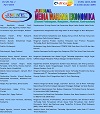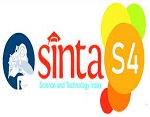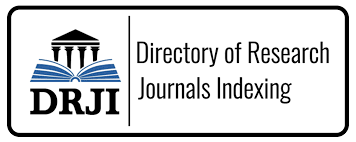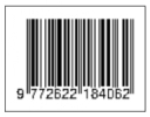Pengaruh Kepemimpinan Dan Budaya Organisasi Terhadap Kinerja Karyawan Di Universitas PGRI Palembang
DOI:
https://doi.org/10.31851/jmwe.v20i1.11223Abstract
ABSTRAK
Penelitian dilaksanakan di Universitas PGRI Palembang dengan metode penelitian analisis deskriptif dengan pendekatan kuantitatif, untuk mengetahui apakah ada pengaruh antara variabel bebas dengan variabel terikat melalui pengujian hipotesis. Populasi penelitian adalah karyawan, berjumlah 134 orang dan sampel berjumlah 57 orang, dipilih berdasarkan teknik Propotional random sampling.Berdasarkan hasil pengolahan data dengan bantuan program SPSS versi 26 for window, maka diketahui bahwa nilai koefisien regresi variabel kepemimpinan (X1) diperoleh 0.574 bernilai positif, dan thitung sebesar 4.797 > ttabel 2.005 dengan tingkat signifikan sebesar 0.000 < 0.05, begitu juga pada variabel Budaya Organisasi nilai koefisien regresi budaya organisasi (X2) diperoleh 0.559 bernilai positif, dan thitung sebesar 4.310 > ttabel 2.005 dengan tingkat signifikan sebesar 0.000 < 0.05. Dan untuk hasil secara simultan (Uji F) menunjukan bahwa Fhitung sebesar 20.245 > Ftabel 3.17 dengan tingkat signifikan sebesar 0.000 < 0.05. Hasil koefisien determinasi seperti yang terdapat pada tabel 15, bahwa nilai R2 sebesar 0,429, hal ini berarti sebesar 42.9%. Dari hasil ini dapat peneliti simpulkan bahwa kinerja karyawan sebesar 42.9% dapat dijelaskan oleh variabel kepemimpinan dan budaya organisasi, sedangkan 57,1 % (100%-42.9%) dipengaruhi oleh variabel lain yang tidak diteliti. Penelitian ini sejalan dengan penelitian Wahyuni (2015), mendapatkan hasil bahwa budaya organisasi mendapatkan pengaruh positif terhadap kinerja karyawan dengan R square dengan nilai 0,364. Tetapi penelitian peneliti mempunyai perbedaan objek dan lokasi penelitian.
Kata kunci: Kepemimpinan, Budaya Organisasi, Kinerja Karyawan
ABSTRACT
The research was conducted at the university of PGRI Palembang through the descriptive analysis with a quantitative approach to look for whether there were influences between independent and dependent variables determined by hypotheses testing. The population of the study were the 134 employees of the university. Utilizing proportional random sampling technique, 57 employees' were selected as the samples of the study. Based on the results of the data analysed with SPSS program Ver 26 for Window, it was found that regression coefficient value leadership variable (X1) was 0. 574 (positive) and t obtained was 4.797 > t table 2.005 with the significant level 0.000 < 0.05. For organizational culture variable (X2), the regression coefficient value was 0.559 (positive) and the t obtained 4.310 > t table 2.005 with the significance level 0.000 < 0.05. For simultaneous result ( F test) showed that F obtained was 20.245 > F table 3.17 with the significant level 0.000 < 0.05. The result of the coefficient of determination as stated on table 15, R2 value was 0.429, which means 42.9 %. From this result, it can be concluded that employee performance (42.9%) was influenced by leadership and organizational culture variables, while 57.1 % (100% - 42.9%) was influenced by other variables which were not investigated. This research was in line with Wahyuni (2015), revealed that organizational culture had positive influence on employees' working performance with r square value 0.364. However, this research differed in objects and location of the study.
Keywords: leadership, organizational culture, working performance
References
Afandi. (2018). Manajemen Sumber Daya Manusia (Teori Konsep dan Indikator). Riau: Zanafa.
Bangun, W. (2012). Manajemen Sumber Daya Manusia. Penerbit Erlangga. Jakarta.
Cahyono, Bambang Tri. (1996). Manajemen Sumber Daya Manusia. Jakarta: IPWI.
Edison, Emron., dkk. (2016). Manajemen Sumber Daya Manusia. Bandung: Alfabeta.
Hasibuan. (2017). Manajemen Sumber Daya Manusia Edisi Revisi. Jakarta: Bumi Aksara.
Khaliq, Ilham. (2015). Pengaruh budaya organisasi, disiplin kerja dan kepemimpinan terhadap kinerja pegawai pada Sekretariat Daerah Kabupaten Indragiri Hulu. Jurnal Tepak Manajemen Bisnis. 7. 76-91.
Ndraha, Taliziduhu. (2005). Teori Budaya Organisasi. Jakarta: Rineka Cipta.
PP No. 60 tahun. Pendidikan Tinggi. (1999). Jakarta: APTISI Pusat.
Robbins, Stephen P. (2011). Perilaku Organisasi. Jakarta: Indeks Kelompok Gramedia.
Siagian, Sondang P. (1998). Teori Motivasi Dan Aplikasinya. Jakarta: Bina Aksara.
Sugiyono. (2017). Metode Penelitian Kuantitatif Kualitatif dan R&D. Bandung: Alfabeta.
Veithzal Rivai. (2014). Manajemen Sumber Daya Manusia untuk Perusahaan. Edisi ke 6. Depok: PT. Raja Grafindo Persada.
------------. (2005). Manajemen Sumber Daya Manusia Untuk Perusahaan dari Teori Ke Praktik. Jakarta: PT. Raja Grafindo Persada .
Wahjosumidjo. (1991). Kepemimpinan yang Efektif. Yogyakarta: Balai Pustaka.
Widoyoko, Eko Putro. (2012). Evaluasi Program Pembelajaran. Yogyakarta: Pustaka Belajar.
Wirawan, Kapita Selekta. (2003). Teori Kepemimpinan jilid I dan II. Yayasan Bangun Indonesia dan Uhamka press, Jakarta
Downloads
Published
Issue
Section
License
Copyright (c) 2023 Jurnal Media Wahana Ekonomika

This work is licensed under a Creative Commons Attribution-NonCommercial 4.0 International License.
The copyright of the received article shall be assigned to the publisher of the journal licensed under a Creative Commons Attribution-NonCommercial 4.0 International License in line with the license, authors and any users (readers and other researchers) are allowed to share and adapt the material only for non-commercial purposes. In addition, the material must be given appropriate credit, provided with a link to the license, and indicated if changes were made. If authors remix, transform or build upon the material, authors must distribute their contributions under the same license as the original.























